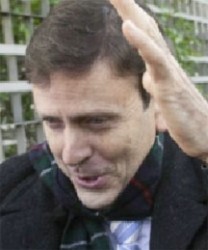MADRID, (Reuters) – Spanish doctor Eufemiano Fuentes, the central figure in the Operation Puerto probe into a doping ring in cycling, got a one-year prison term yesterday as the judge ordered all evidence from the case to be destroyed.
Fuentes – who is unlikely to be jailed because sentences under two years in Spain are usually suspended – was convicted for crimes against public health, barred from practicing sports medicine for four years and fined
.
However, judge Julia Santamaria’s decision not to release case evidence, including bags of blood seized in police raids, to anti-doping authorities for further investigations hit hopes that the case would unmask athletes caught up in the doping programme
.
Fuentes’s co-defendant Ignacio Labarta received a four-month jail term and was also barred from practice for four years, while Manolo Saiz, Vicente Belda and Fuentes’s sister Yolanda were all cleared.

The Spanish anti-doping agency (AEA) said it would appeal the judge’s ruling to destroy the evidence.
“It (the verdict) is positive, but clearly unsatisfactory,” Ana Munoz, head of the AEA, told a news conference. “It isn’t over yet.”
“An option is an appeal against the decision… the AEA can and will start the process.
“It will ask for the bags of blood. We respect the sentence and the independence of the judge but we don’t share her interpretation.”
The Spanish Cycling Federation (RFEC) also disagreed with the judge’s verdict because their request for access to the bags of blood had been denied.
“They would be necessary for the initiation of sporting disciplinary action,” the federation said in a statement.
ACCESS TO EVIDENCE
The RFEC, World Anti-Doping Agency (WADA), International Cycling Union (UCI) and Italian Olympic Committee (CONI) were all represented in the three-month trial and have asked for access to the evidence.
They are keen to secure the names of athletes involved and to search for possible evidence of wrongdoing in other sports.
The Puerto case has attracted international attention because some of Fuentes’s clients were successful professional riders, including American Tyler Hamilton who gave evidence in February.
Fuentes, who denied doping, said in his opening testimony he also had clients in sports including soccer, tennis, athletics and boxing.
The UK’s anti-doping chief executive Andy Parkinson said: “We are disappointed in the decision by the Spanish authorities today.
“Dr Fuentes has admitted to having been involved in multiple prohibited doping activities, and linked with multiple unnamed athletes.
“It therefore cannot be right that these names will remain unknown and that no immediate action can be taken by the anti-doping community to protect our clean athletes.”
Former cyclist Jesus Manzano who gave evidence in the trial, told Reuters Television: “It’s shameful, I sincerely don’t know why they bother charging a person in order to deliver a verdict like that.
“You don’t have to be a judge to deliver a sentence like that, a builder could it,” added the Spaniard.
Former cycling team director Saiz said: “For me Operation Puerto is over and I want to turn that page and to thank my family and lawyer and my friends for all their support over the years… and to a cyclist in particular, Carlos Sastre.
“He remembered me when he was in the Tour de France and that meant a lot to me.”
As Spain’s current anti-doping legislation was not in force in 2006 when police seized anabolic steroids, transfusion equipment and blood bags in raids, the five co-defendants were tried only for violating public health regulations.
The public prosecutor had asked for jail sentences of two years.
AVOID DETECTION
“It has been proven that since at least 2002 Fuentes was carrying out practices consistent with those of blood extraction… for later re-infusion… with the aim to artificially increase the physical performance of the cyclist,” the verdict said.
“In some cases, on top of the extraction and re-infusion of blood, Fuentes dispensed to the cyclists certain specialised pharmaceutical products included on the list of substances banned in sport.”
The report listed substances such as EPO, growth hormones and testosterone.
“Fuentes planned the system… co-ordinated their physical preparation with a view to the calendar of competitions in a season for each cyclist,” the report added.
“The end was to optimise competition results and at the same time to help the cyclist avoid detection in the anti-doping controls.”
The practice of boosting the flow of oxygen in the blood, the use of banned substances, and the methods used constituted “an important risk for the health of the cyclist.”
Spain has been hoping the trial would help to dispel the impression that the nation was soft on doping and boost Madrid’s bid to win the right to host the 2020 Olympic Games.
The country is pushing through parliament anti-doping legislation which the government says will bring Spain into line with international norms.





